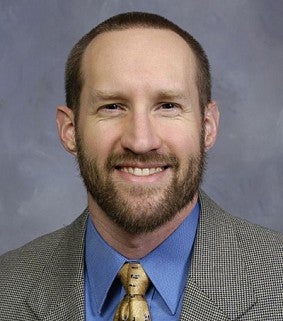Among all the faculty and graduate fellows back in front of classrooms full of undergraduates, two might have a little more spring in their step this fall: Stephen Fickas and John Halliwill, this year’s recipients of the Williams Fellowships.
Fickas is a professor of computer science and Halliwill is a professor of human physiology. Nominated by their peers, the two were selected for their commitment to undergraduate education and to creating academically challenging, creative and engaged classes.
All Williams Fellows receive a $5,000 award to acknowledge their efforts. The fellow’s department also receives a $5,000 award to enhance the teaching and learning experience of undergraduates.
Fickas was selected for his work creating immersive and hands-on classes. To teach students about the increasingly important Internet of Things, he created a miniature smart factory floor using cheap computer cards to run self-driving cars, allowing students to physically engage with the subject.
Department head Joe Sventek, in his nomination letter, quoted one student from the class who said, “I love this course to my core. This is the way all college courses should be taught.”
Fickas also developed a new data science curriculum for non-computer science majors. Data capture and analysis is becoming a big aspect of many fields outside computer science, and Fickas is helping nonmajors learn how to look at and use Big Data in ways that expand their skills and boost their job prospects.

Also, Halliwill has created opportunities for human physiology undergraduates to explore research and learn advanced laboratory methods rarely available outside of a medical school. His students help with research being done in his lab, and he has overseen many honors theses.
“At a time in which there are few opportunities for students outside of a medical school setting to learn sophisticated experimental techniques for use in human subjects, he introduces students to state-of-the-art research in human integrative physiology in a non-medical school environment,” said Li-Shan Chou, the department head, in his nominating letter. “He provides undergraduate students opportunities to engage and help with research studies being conducted in his laboratory.”
Williams Fellowships are provided through the Tom and Carol Williams Fund for Undergraduate Education and are awarded by the Williams Council, a presidential advisory group that includes some of the university's top teaching faculty. The fellows program recognizes faculty who have made outstanding contributions to undergraduate learning at the UO.
The undergraduate education fund was established to provide financial support for innovative ideas that contribute to the quality of the education experience for UO undergraduate students. Tom and Carol Williams endowed the fund in 1995, and it has since awarded more than 75 grants to faculty in various disciplines.
More information is available on the Williams Fund website.

